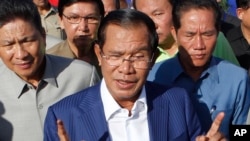Prime Minister Hun Sen on Tuesday announced he would hold biannual meetings with representatives of 16 of Cambodia’s opposition parties where they will be able to directly raise issues with the premier.
The Supreme Council of Consultations (SCC), as the forum will be known, will provide a check on the power of the ruling Cambodian People’s Party, Hun Sen said, after the party won a landslide victory at the polls on July 29.
Hun Sen made the announcement following a meeting with the parties at the Peace Palace. Four of the 16 political parties invited to attend the event declined, including the League for Democracy Party (LDP), Grassroots Democracy Party (GDP).
“Participation will be voluntary for the parties which took part in the 6th mandate elections with the consent from the Prime Minister. Each party will have two delegates appointed by a royal decree proposed by the Prime Minister. The forum leader will take turns monthly according to the party's rank number in the ballot,” a post on Hun Sen’s Facebook page read.
The SCC is the first formal venue for opposition parties without seats in parliament to make policy suggestions to the government.
Phay Siphan, a government spokesman, said the members of the SCC will be accorded a rank equivalent to that of a minister and will have a formal governmental advisory role.
“This institution is created by royal decree. So there will be benefits, but no salary, for gasoline, or food for attending the monthly meetings,” he said.
The Supreme Court banned Cambodia’s only sitting opposition party, the Cambodia National Rescue Party, in November over unsubstantiated claims of a plot to overthrow Hun Sen. Prior to its dissolution the CNRP had held a large minority of 55 seats in the 123-seat National Assembly.
The one-party parliament is due to hold its first session on September 5.
Meas Nee, a political commentator, and an analyst said the move to create the SCC was likely a bid to deflect criticism over the CPP’s dismemberment of the opposition and unchallenged position in the Cambodian democratic system.
“If this is just for show or to cast a spell on the public to project the image that there is the participation of many political parties ... then it is of no use,” he said.
Cambodia drew criticism from the west over its handling of the election and several senior regime officials face limited sanctions as a result of the pre-election crackdown on the CNRP, civil society, and the media.
But China and Russia have lent their support to Hun Sen and the CPP, decreasing the pressure on Phnom Penh.
The European Union, however, is considering removing Cambodia from a preferential trade scheme that allows Cambodian garment exports to enter European markets with little or no tariffs imposed.




